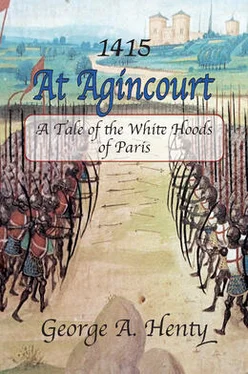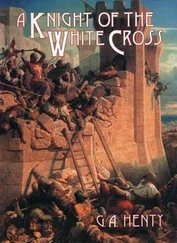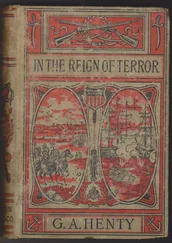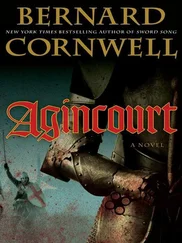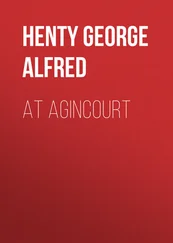Perceiving at last that the constable was determined not to begin the battle, he sent off two detachments from the rear of his army, so that their movements should be concealed from the sight of the French. One of these, composed of archers, was to take post in the wood on the left hand of the French, the other was to move on through the wood, to come down in their rear, and to set on fire some barns and houses there, and so create a panic. He waited until noon, by which time he thought that both detachments would have reached the posts assigned to them, and then gave the orders for the advance. The archers were delighted when their commander, Sir Thomas Erpingham, repeated the order. None of them had put on his armour, and many had thrown off their jerkins so as to have a freer use of their arms either for bow or axe. Each man plucked up his stake, and the whole moved forward in orderly array until within bow-shot of the enemy. Then the archers again stuck their stakes into the ground, and, taking up their position as before, raised a mighty shout as they let fly a volley of arrows into the enemy.
The shout was echoed from the wood on the French left, and the archers there at once plied their bows, and from both flank and front showers of arrows fell among the French. As originally formed up, the latter's van should have been covered by archers and cross-bowmen, but, from the anxiety of the knights and nobles to be first to attack, the footmen had been pushed back to the rear, a position which they were doubtless not sorry to occupy, remembering how at Crecy the cross—bowmen had been trampled down and slain by the French knights, desirous of getting through them to attack the English. Therefore, there stood none between the archers and the French array of knights, and the latter suffered heavily from the rain of arrows. Sir Clugnet de Brabant was the first to take the offensive, and with twelve hundred men-at-arms charged down upon the archers with loud shouts. The horses, however, were stiff and weary from standing so long in order; the deep and slippery ground, and the weight of their heavily-armed riders caused them to stagger and stumble, and the storm of arrows that smote them as soon as they got into motion added to the disorder.
So accurate was the aim of the archers, that most of the arrows struck the knights on their helmets and vizors. Many fell shot through the brain, and so terrible was the rain of arrows that all had to bend down their heads so as to save their faces. Many of the archers, too, shot at the horses; some of these were killed and many wounded, and the latter swerving and turning aside added to the confusion. And when at length Sir Clugnet and the leaders reached the line of stakes in front of the archers, only about a hundred and fifty of the twelve hundred men were behind them.
The horses drew up on reaching the hedge of stakes. Their riders could give them no guidance, for without deigning to move from their order the archers continued to keep up their storm of arrows, which at such close quarters pierced all but the very finest armour, while it was certain death to the knights to raise their heads to get a glance at the situation. The horses, maddened with the pain of the arrows, soon settled the matter. Some turned and rushed off madly, carrying confusion into the ranks of the first division, others galloped off to the right or left, and of the twelve hundred men who charged, three only broke through the line of stakes, and these were instantly killed by the bill-hooks and axes of the archers.
The second line of battle was now in disorder, broken by the fugitive men and horses of Sir Clugnet's party, smitten with the arrows to which they had been exposed as that party melted away, and by those of the English archers in the wood on their flank. The confusion heightened every moment as wounded knights tried to withdraw from the fight, and others from behind struggled to take their places in front. Soon the disorder became terrible. The archers plucked up their stakes and ran forward; the French line recoiled at their approach in order to get into fairer order; and the archers, with loud shouts of victory, slung their bows behind them, dropped the stakes, and with axe and bill-hook rushed at the horsemen. These were too tightly wedged together to use their lances, and as they had retired they had come into newly-ploughed ground, which had been so soaked by the heavy rain that the horses sank in the deep mud to their knees, many almost to their bellies. Into the midst of this helpless crowd of armed men the English archers burst. Embarrassed by their struggling horses, scarcely able to wield their arms in the press, seeing but scantily, and that only in front through the narrow slits of their vizors, the chivalry of France died almost unresistingly.
The Constable of France and many of the highest nobles and most distinguished knights fell, and but few of the first line made their escape: these, passing through the second division, in order to draw up behind, threw this also into some confusion. The Duke de Brabant, who had just arrived on the field, charged down upon the flank of the archers. These met him fearlessly, and he and most of those with him were killed. This fight had, however, given time to the second division to close up their ranks. The archers would have attacked them, but the king caused the signal for them to halt to be sounded, and riding up formed them in order again. The French were unable to take advantage of the moment to try and recover their lost ground, for the horses were knee-deep in the ground, upon which they had all night been trampling, and into which the weight of their own and their riders' armour sunk them deeply.
“Now, my lords,” the king said, turning to those around him, “our brave archers have done their share; it is our turn;” and then, as arranged, all dismounted and marched forward against the enemy.
In accordance with his orders, Sir Eustace de Villeroy and Guy were posted close to the king, while John Harpen led the men-at-arms from Summerley. For a time the battle raged fiercely. In the centre fought the king with his nobles and knights; while the archers, who had most of them thrown off their shoes and were able to move lightly over the treacherous ground, threw themselves upon the enemy's flanks, and did dreadful execution there. In the centre, however, the progress of the English was slower. The French knights made the most desperate efforts to attack the king himself, and pressed forward to reach the royal banner. His brother, the Duke of Clarence, was wounded, and would have been killed had not the king himself, with a few of his knights, taken post around him, and kept off the attacks of his foes until he recovered his feet. Almost immediately afterwards a band of eighteen knights, under the banner of the Lord of Croye, who had bound themselves by an oath to take or kill the king, charged down upon him. One of them struck him so heavy a blow on the head with a mace that the king was beaten to his knee, but his knights closed in round him, and every one of his assailants was killed.
The Duke of Alencon next charged down with a strong following; he cut his way to the royal standard, and struck the Duke of York dead with a blow of his battle-axe. Henry sprung forward, but Alencon's weapon again fell, and striking him on the head clipped off a portion of the crown which Henry wore round his helmet. But before the French knight could repeat the stroke Guy Aylmer sprung forward and struck so heavy a blow full on the duke's vizor that he fell from his horse dead. His fall completed the confusion and dismay among the French, and the second division of their army, which had hitherto fought gallantly, now gave way. Many were taken prisoners. The third division, although alone vastly superior in numbers to the English, seeing the destruction of the others, began to draw off. They had moved but a short distance when loud shouts were heard in the English rear. Two or three French knights, with a body of several hundred armed peasants, had suddenly fallen upon the English baggage and horses which had been left at Maisoncelles. Many of the guard had gone off to join in the battle, so that the attack was successful, a portion of the baggage, including the king's own wardrobe, and a great number of horses being captured.
Читать дальше
